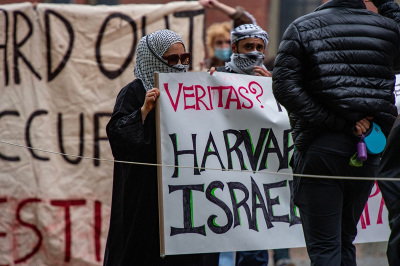The newest ideological contagion at American universities

The pro-Palestinian club demonstrations on college campuses are a symptom of our societal departure from reason.
Students for Justice in Palestine (SJP) is a college group on about 300 college campuses today. In 1992 at SJP’s inception, the college clubs initially began as less radical, decentralized student operations, according to the Jerusalem Center for Public Affairs (JCPA). However, in 2010 the National SJP group was founded, and that began the terroristic rhetoric found in SJP groups today.
The national SJP chapter was formed at a conference sponsored by the Boycott National Committee, specifically by attendees who were members of the American Muslims for Palestine (AMP) and the US Palestinian Community Network, all of which funded terror groups. Furthermore, there have also been numerous convicted terrorists who have spoken at National SJP conferences like Rasmea Odeh, a member of the Popular Front for the Liberation of Palestine; and Khader Adnan, a member of Palestinian Islamic Jihad (JCPA).
The terroristic ideology within SJP exists in many pro-Palestinian campus clubs that have been protesting in recent months. The most obvious example is Harvard’s letter signed by over 30 student groups that stated that Israel was “entirely responsible” for the violence that occurred on October 7th. Some student groups went even further than this by celebrating the atrocity; Boston University's Students for Justice in Palestine chapter posted “victory is ours” on their social media following the attack. These actions, coupled with the intimidation of Jewish students on campus, show how students have successfully become radicalized independent of SJP.
Chants such as “Intifada” and “From the river to the sea, Palestine will be free” are commonly heard from pro-Palestine groups. These chants are far from the mainstream. “Intifada” means to “shake off” and is a call for uprising that alludes to past violent uprisings in Palestine.
It’s understandable, therefore, why Jews on campus are terrified of being targeted when their classmates are calling for a violent uprising. Similarly, the phrase “From the river to the sea, Palestine will be free” is found in the Hamas charter and is a call for the unequivocal destruction of the Jewish people. It is undeniably a rejection of a two-state solution and a peace settlement between Palestine and Israel. In a few words, it captures an identical ideology to Hamas extremism; it is similar to saying, “Israel will exist and will continue to exist until Islam will obliterate it, just as it obliterated others before it,” a sentiment quoted from the Hamas Covenant Preamble.
This pattern of rising antisemitism on campus is because colleges are failing. Our college professors, instead of teaching skills that would arm students against propaganda, practice indoctrination. Many professors themselves are pro-Palestine extremists: consider the 65 Harvard faculty members who created a pro-Palestine advocacy group and the Cornell professor who praised the actions of October 7th as “exhilarating.”
To rectify this, we need an intellectual rebirth at our universities – a new enlightenment that values reason and viewpoint diversity, as well as undermines the political dogma that has led to this level of antisemitism.
Kathryn Huth graduated from California Polytechnic State University, SLO and works as a Fellow at the Clare Boothe Luce Center for Conservative Women.




























